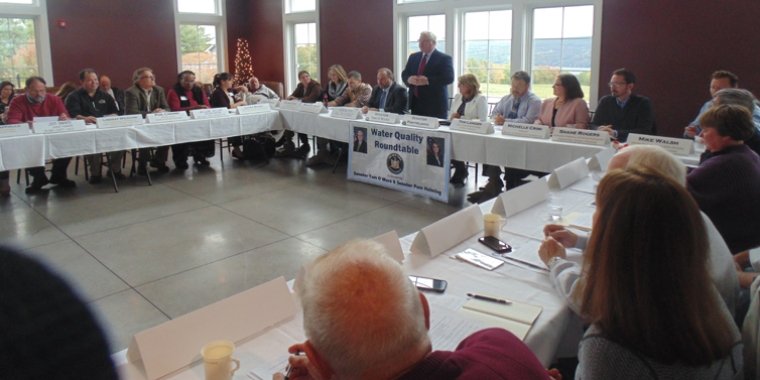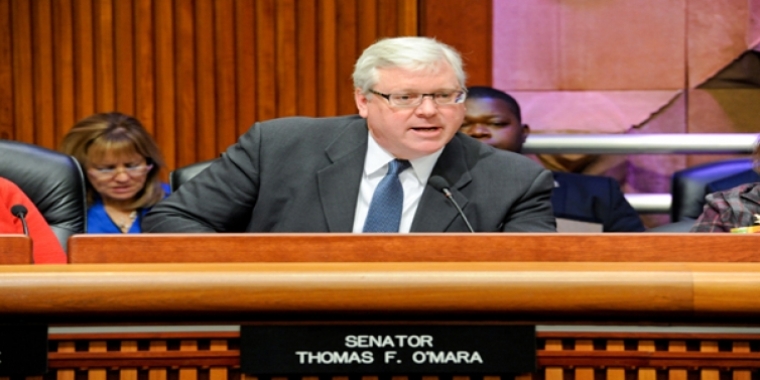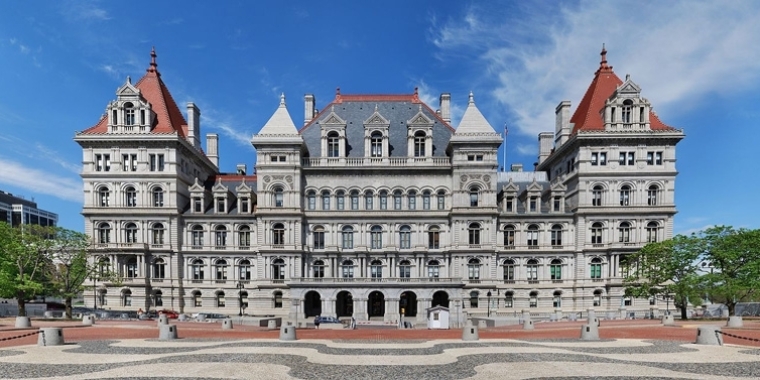
Senators O'Mara and Helming hold ‘Water Quality Roundtable' in Dundee on Wednesday: Forum brings together water quality advocates and experts to share information, discuss challenges (UPDATED)
October 24, 2018
-
ISSUE:
- Water quality

Dundee, N.Y., October 24—State Senators Tom O’Mara (R,C,I-Big Flats) and Pam Helming (R,C,I-Canandaigua) today sponsored a public round table discussion, “The Future of Water Quality: A Discussion on Challenges, Crises and Responses,” in Dundee.
The water quality forum was held at Starkey’s Lookout in Dundee (5428 State Route 14) from 1:00 p.m. to 3:00 p.m.
O’Mara and Helming were joined at the forum by a panel of water quality educators and experts, and agriculture and environmental advocates representing the Beacon Institute for Rivers and Estuaries, Cornell University, Cornell Cooperative Extension, Clarkson University, the Finger Lakes Institute, Hobart and William Smith Colleges, the New York Farm Bureau, the Keuka Lake Association, Seneca Lake Pure Waters, and regional Soil and Water Conservation Districts. [See attached list of panelists above]
The group identified challenges and shared information, data, and resources. [View a replay of yesterday's forum, courtesy of Cornell Cooperative Extension-Yates County, HERE]
Harmful algal blooms (HABs), invasive species, non-point source pollution and other contaminants, flood and erosion control, habitat preservation, and water quality infrastructure highlighted the range of issues discussed by the panelists.
Senator O’Mara, Chair of the Senate Environmental Conservation Committee since 2015, said, "We know that the issue of water quality is here to stay. These challenges and crises have dominated the Legislature’s attention over the past several years during which I have served as Chair of the Environmental Conservation Committee. Water quality is one of the high priority challenges facing the future of the Southern Tier and Finger Lakes regions. From harmful algal blooms to invasive species, and from non-point source pollution to water quality infrastructure, how we understand and proactively respond to these concerns is fundamentally important. It is important for drinking water, the tourism economy, and the recreational use of lakes and other waterways. I greatly appreciate this opportunity with Senator Helming to welcome the participation and input of so many water quality experts, educators, and concerned citizens. Their input today and in the days, months and years ahead will make the difference.”
Senator Helming, Chair of the Legislative Rural Resources Commission, said, “The Finger Lakes have experienced significant amounts of harmful algal blooms and invasive species in recent years. These contaminants threaten municipal water systems that many residents count on for their drinking water supply, and they pose serious dangers for local residents who draw their water directly from the lake. They also hinder the recreational uses of the lakes that draw countless tourists to our region. Even before I became an elected official, my family and I were involved in water quality monitoring on Canandaigua Lake, and protecting our water still remains a priority for all of us. As State Senator, I have been working diligently with Senator O’Mara, water quality experts, municipal officials, and community leaders to come together and find solutions for these problems. We must continue to address water quality issues in order to preserve the health of our people and our environment as well as to protect our economy and our tourism industry. I appreciated taking part in this roundtable discussion with Senator O’Mara and others to share information and resources as we continue to identify and address the water quality challenges before us."
Over the past several years, O’Mara and Helming have played key roles in developing a comprehensive series of Senate initiatives to combat invasive species, address flood control, respond to HABs, and improve drinking water safety and the overall quality of water infrastructure for all New Yorkers.
For example the 2015-2016 state budget, for the first time, established a fully funded, $300-million Environmental Protection Fund (EPF), a move that many conservation advocates had sought for many years. The EPF supports many critical conservation initiatives including clean air and water projects, flood control and restoration, and open space preservation. The 2015-16 budget also established the state’s “Water Quality Infrastructure Improvement Act” to help localities undertake water infrastructure improvement projects including sewer and municipal water line repairs – an action that has become particularly timely as drinking water quality concerns and crises regionally, statewide, and across the nation become increasingly acute.
In 2016, a new law developed and sponsored by O’Mara made New York the first state in the nation to require public schools to test their drinking water systems for lead contamination.
The 2017-18 state budget, largely at the Senate’s insistence, included the state’s largest-ever one-time investment, $2.5 billion, to address water quality challenges statewide.
Earlier this year, Helming and O’Mara took the lead to ensure that the 2018-19 state budget included approximately $60 million in grant funding to begin developing programs and strategies to combat HABs on impacted lakes and other waterbodies.
Share this Article or Press Release
Newsroom
Go to Newsroom


